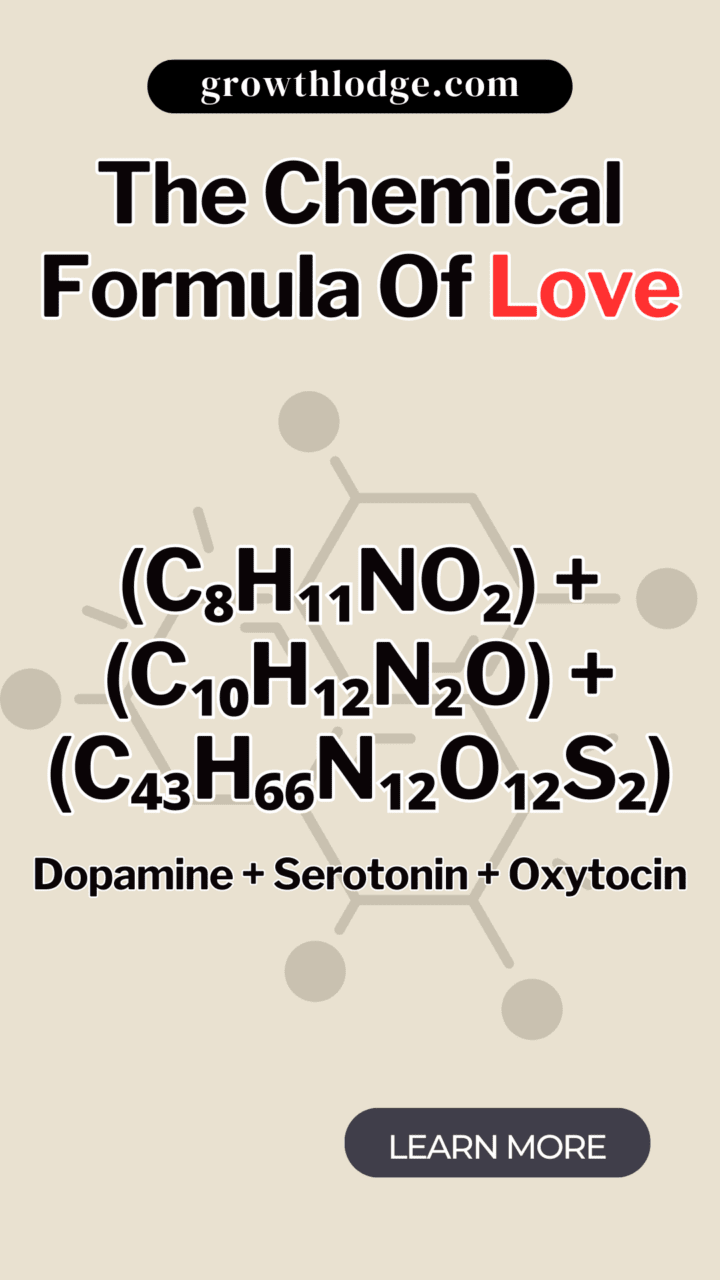Sharing is caring!
When we think about love, we often picture red roses, sweet letters, and romantic moments. We think of fairy tales, movies, and songs.
We imagine heartbeats racing and dreamy gazes. But did you know that there’s more to love than just emotions? Behind the butterflies in our stomach and the rosy cheeks, there’s a fascinating world of chemicals at play!
You might be wondering, “Chemicals? In love? How does that work?” It’s a great question. Our body has its own way of communicating and reacting to different feelings and situations.
Inside us, there are tiny messengers called hormones. These hormones are responsible for a lot of things, including how we feel when we’re in love. They’re like little notes that our brain and body send to each other.
The Chemical Formula Of Love
(C₈H₁₁NO₂) + (C₁₀H₁₂N₂O) + (C₄₃H₆₆N₁₂O₁₂S₂)
1. C₈H₁₁NO₂ corresponds to Dopamine, a neurotransmitter that plays several important roles in both the central nervous system and the peripheral nervous system, particularly in the pleasure and reward pathways of the brain.
2. C₁₀H₁₂N₂O correlates with Serotonin (5-hydroxytryptamine or 5-HT), a neurotransmitter that contributes to feelings of well-being and happiness.
3. C₄₃H₆₆N₁₂O₁₂S₂ is Oxytocin, a peptide hormone and neuropeptide that plays a role in social bonding, reproduction, and childbirth.
So, in words, our love chemical translates to Dopamine + Serotonin + Oxytocin.
Collectively, these molecules play key roles in the feelings and behaviors associated with love and affection, as mentioned in the previous discussions.
When people refer to the “chemistry of love,” they are often talking about these and other chemicals that influence our emotions, attractions, and attachments.
[Interesting: “Will I Ever Find Love Again?” – 10 Signs You Will]
The Key Chemicals Associated With Love

1. Oxytocin – The Bonding Molecule
Oxytocin (Chemical Formula: C₄₃H₆₆N₁₂O₁₂S₂) often gets the limelight in conversations about love.
Rightfully so, as this hormone plays a central role in social bonds and maternal behaviors. When you hug someone you care about or share an intimate moment, oxytocin levels typically rise.
This isn’t just about romantic love, though. Oxytocin also has a hand in strengthening the bond between a mother and her newborn or between close friends.
2. Dopamine – The Pleasure Chemical
Think about the exhilaration of a first date or that buzz you feel after a passionate kiss. Dopamine is at the heart of these experiences.
This neurotransmitter is all about pleasure, reward, and motivation. And in the context of love? It gives you that delightful, head-over-heels feeling.
Love can be addictive, and dopamine is a reason why. The brain often craves experiences that release dopamine, which is why the early stages of romance can feel so intense.
That longing to see or hear from someone? Dopamine’s influence is strong there.
3. Serotonin – The Mood Regulator
Serotonin (C₁₀H₁₂N₂O) impacts our mood, and interestingly, when you’re in the early stages of love, serotonin levels can dip.
This might explain why, sometimes, love can feel a bit like obsession. You can’t stop thinking about that special someone.
However, as relationships mature, serotonin levels stabilize. The obsessive thoughts mellow out, but the bond deepens. The rollercoaster of emotions in love’s initial phases eventually gives way to a more stable and lasting connection.
4. Vasopressin – The Commitment Compound

While oxytocin is about bonding, vasopressin plays a role in long-term commitment. Think about those couples who’ve weathered life’s storms and celebrated many anniversaries together. Vasopressin might have a say in such enduring commitments.
The importance of vasopressin came to light in studies involving voles, small mammals. In species that form long-term bonds, vasopressin activity was notably high. This hints at its role in enabling long-term connections in humans too.
5. Endorphins – The Natural Painkillers
Being in love can be a natural painkiller, and endorphins play a role in this. These chemicals help to combat stress and pain by blocking pain signals and promoting feelings of euphoria.
Ever noticed how some aches or worries seem to fade away in the company of a loved one?
This is the body’s natural way of coping with discomfort. So, beyond just feeling good, love, with the help of endorphins, can be a potent remedy for life’s minor aches and stresses.
Chemical Formula of Endorphins: C₈H₁₁NO₂
[Also Read: 10 Psychological Triggers that Spark Attraction In Anyone]
Conclusion
Love might seem like a magical feeling that sweeps us off our feet, but it’s also deeply rooted in science. Those warm feelings are because of the special chemicals dancing around in our bodies.
Just like how a recipe needs certain ingredients to make a delicious dish, our bodies use these chemicals to create the wonderful feeling of love. Isn’t it amazing how nature has its own special way of making us feel connected to one another?
FAQs

Why is there no single “chemical formula” for love?
Love is a complex emotion that’s influenced by a combination of hormones and neurotransmitters in the brain.
Instead of being linked to a single chemical formula, it’s more accurate to say love involves a cocktail of chemicals, including Dopamine, Serotonin, and Oxytocin. Each contributes uniquely to the sensations and feelings we associate with love.
Are these “love chemicals” only active when we’re in love?
Dopamine, for instance, is involved in pleasure and reward pathways, and can be released during other enjoyable activities like eating or listening to music.
Similarly, Oxytocin plays a role in childbirth and bonding, while Serotonin affects mood in various contexts. So, these chemicals aren’t exclusive to the feeling of love.
Does everyone have the same chemical response to love?
While the chemicals associated with love are present in almost everyone, individual responses can vary.
Factors like genetics, past experiences, current environment, and even one’s mental health can influence how these chemicals are produced and processed. This might explain why love feels intense for some, while others might experience it in a more subdued manner.
- All photos from freepik.com
Sharing is caring!

